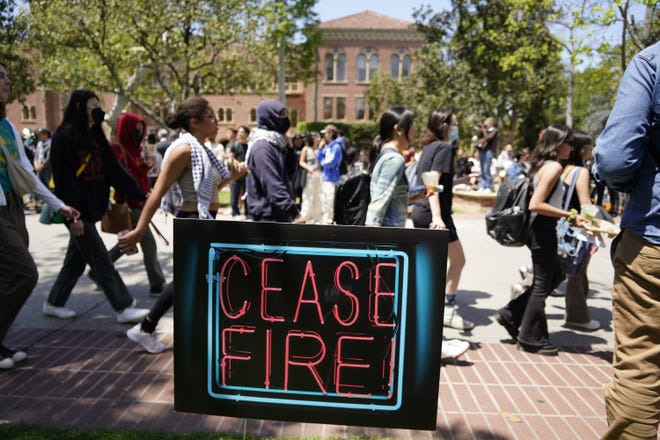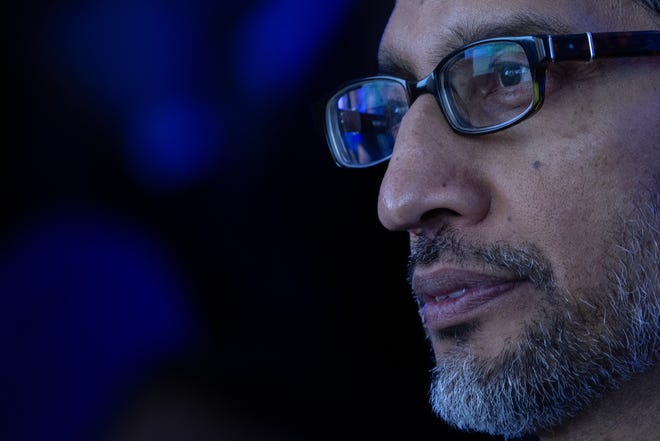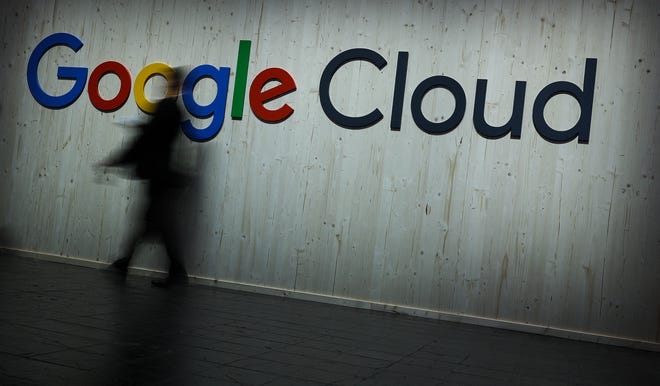
For years as part of a progressive work culture that prized free expression and open debate, Google encouraged employees to bring their whole selves to work.
And Google employees did.
On internal message boards and the streets, they agitated for change around the globe and inside their own company.
Googlers – as they are known – held a walkout to challenge how the company treated executives accused of sexual misconduct, pressured Google not to renew a contract with the Pentagon, battled plans to build a censored search engine for China, lobbied for Google not to bid on a contract working with U.S. Customs and Border Protection and joined shareholder activists in pushing Google to increase the diversity of its workforce.
But when employees held sit-ins at the company’s offices in New York and Sunnyvale, California, last week to protest a $1.2 billion contract to provide the Israeli government with cloud computing and artificial intelligence services, the company called the police. Then it fired them.
The employees claimed that Israel is using the company’s services to harm Palestinians. Google has denied those claims.
“This is a business, and not a place to act in a way that disrupts coworkers or makes them feel unsafe, to attempt to use the company as a personal platform or to fight over disruptive issues or debate politics,” CEO Sundar Pichai wrote in an internal memo posted online.

With tensions over the war in Gaza spilling into workplaces and onto college campuses across America, employers are increasingly steering clear of divisive issues – and they expect their employees to do the same.
“The Israel-Hamas war is dividing employees in ways that I don’t think the debate over police brutality, for instance, ever did,” said David Primo, a professor of political science and business administration at the University of Rochester in New York.

Gaza conflict, GOP backlash cause abrupt shift
For businesses leery of political blowback, the Gaza conflict “crystallized what had been building over the last couple of years,” according to Primo.
Driven by younger workers and customers who gravitate to brands that align with their values, businesses in recent years began staking out public positions on social issues, including immigration, gay rights, gun control and racial justice after George Floyd’s 2020 murder.
That was an abrupt shift from the past when the only issues that businesses waded into were ones that directly affected their bottom line such as trade and taxes.
Employee activism also swelled. Salesforce.com staffers lobbied CEO Marc Benioff to cancel the company’s contracts with the U.S. Customs and Border Protection agency. Microsoft employees demanded that it jettison a $480 million army contract for augmented reality headsets. Amazon employees walked out to protest the company’s lack of progress on climate change goals.
Then came the conservative backlash: Disney’s face-off with Florida Gov. Ron DeSantis, “Bud Lighting” boycotts, anti-diversity, equity and inclusion legislation and litigation and shareholder fights as Republicans took on “woke” policies in executive suites and boardrooms.
“Companies with visible brands have been paying attention to the struggles of Disney, Target, Bud Light and even university brands like Harvard and Penn and they don’t want to be the next targets of government officials or activists on the other side of a contentious social or political issue,” Primo said.
Bosses adopt a ‘say less’ policy on contentious social issues
A survey of 600 C-suite leaders released by executive women networking group Chief this week showed that nearly 9 in 10 are wary of taking a public stand on social issues in an increasingly partisan environment.
Companies have pulled back on public statements about hot-button topics to avoid alienating customers and investors.
In an increasingly polarized political environment, fewer companies spoke up when the Supreme Court overturned Roe v. Wade. Dozens tweaked descriptions of diversity, equity and inclusion initiatives in annual reports to investors. Major brands walked back LGBTQ+ campaigns. Business leaders stopped talking about environmental, social and governance.
“When we looked at how executives feel about taking – or not taking – a stand on social issues, it was not surprising to see their hesitance, especially in an election year,” Carolyn Childers, co-founder and CEO of Chief, said in a statement.
Increasingly, that mindset extends to rank-and-file activism, too, as tensions grow between corporate interests and workers.
Few legal protections for employee activism, speech
“This is certainly a U-turn from a few years ago when activist employees seemed to be gaining the upper hand,” said Jerry Davis, a professor of business administration and sociology at the University of Michigan.
The tighter job market in tech has played a role as have the limited legal rights of employees.
Legal experts say at-will workers in the private sector are not protected by the First Amendment guarantee of free speech and sit-ins are not generally considered a protected means of protest. Numerous workers, for example, were fired for social media posts about the Israel-Hamas war.
“Employees have been fired, often without legal recourse, for criticizing their companies on social media, for running for office, or even for having a bumper sticker supporting a political candidate whose election the boss opposes,” law professor University Minnesota law professor Charlotte Garden wrote in 2022. “The freedom of speech that so many Americans valorize is in practical effect illusory for many American workers.”

Mixing work with politics can be distracting in the office and lower productivity. And workplace surveys show few kumbaya moments.
More than half (51%) of workers recently surveyed by ResumeHelp said they never or rarely discuss politics at work. What’s more, 45% have regretted talking about politics at work and 51% said workplace discussions hurt the work environment.
“Ultimately we are a workplace,” Pichai told Google employees. “This is too important a moment as a company for us to be distracted.”
Google sit-in spurs standoff
Julia Hobsbawm, author of “Working Assumptions,” says Google’s hard line on the Gaza protesters marks a turning point and will open the door to more organizations shutting down employee activists.
No Tech for Apartheid, the group that organized the Google protests, said the company fired 20 additional workers this week, including bystanders who did not participate in or cause disruption during last week’s protests.
Google said the protesters violated company policy by taking over office spaces and disrupting work. The company said it fired additional employees this week after an investigation identified those “definitively involved in disruptive activity inside our buildings.”

Alec Story, one of the employees who was fired, went to work for Google straight out of college 12 years ago.
“I’ve been a part of trying to make Google a better place since day one and it is so disheartening to see the corporate leadership saying: How dare you try to make Google better,” Story said. “It really contrasts with the mythology that Google built around themselves when I joined.”
He says Google’s attempts to silence workers who oppose the Israeli contract and the harassment of Palestinian, Muslim and Arab employees are a betrayal of the company’s founding values.
“We want to be able to come to work in a place where not only are we told to bring our whole selves to work but we actually can,” Story said. “And part of my whole self and part of my Palestinian, Arab and Muslim co-workers’ whole self is speaking out about these horrible things happening to their families.”






